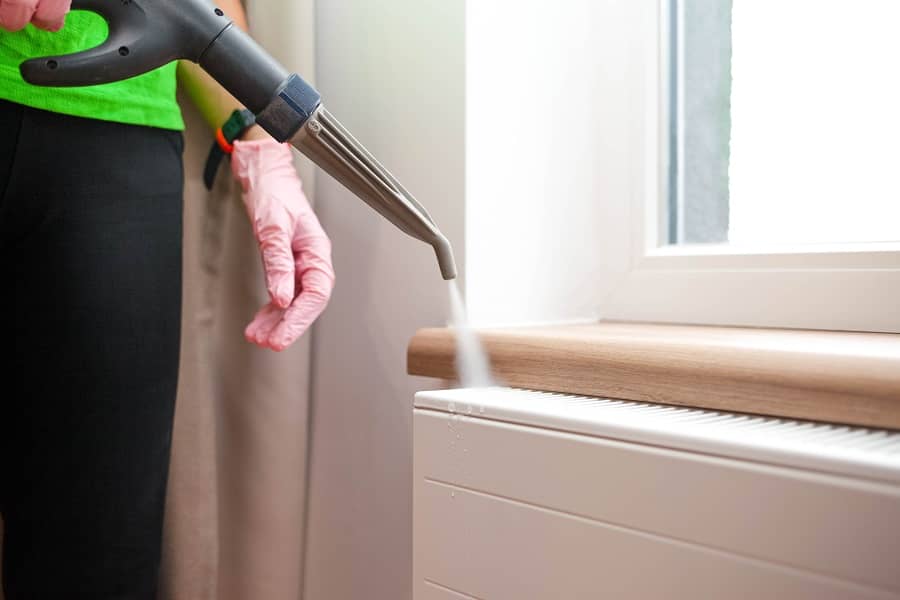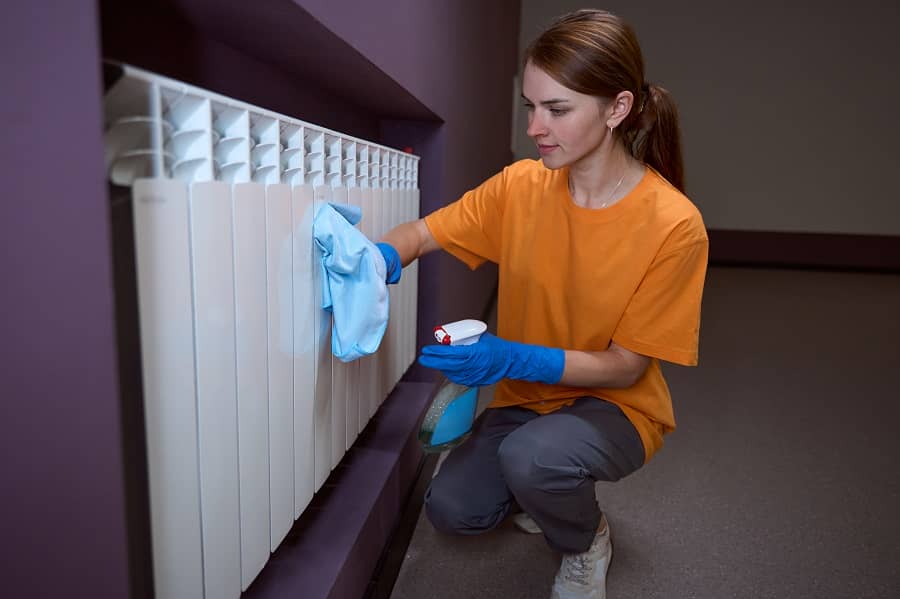Contents
ToggleWhy does your radiator smell?
In most cases, if you notice a smell coming from your radiator, it is not an immediate reason to push the panic button, however unpleasant the sensation might be.
But of course, it’s far from ideal either, and any scent that is out of the ordinary should be looked into and deciphered to address the issue.
But why does your radiator smell? And what can be done to rectify the problem?
This blog article will explore the most typical smells that emerge from home radiators, outlining their causes and potential remedies too…

What types of smells come from radiators?
There are a range of smells that can emerge from radiators for a variety of different reasons, some of which are much less pleasant than others.
So, what sort of smells are coming from your radiators, and what is causing the odours?
We might as well begin with one of the foulest prospects…
Gas smell from radiators
The likes of carbon monoxide, which is unscented regardless, cannot leak from designer radiators, so although the detection of a gassy odour might pose an immediate cause for concern, your radiators are unlikely to be providing a reason for alarm.
What could be significant however, is if you notice a sulphuric scent, or an unpleasant eggy sensation emanating – this could suggest a conglomeration of hydrogen within your radiators, which can damage them internally and lead to a build-up of rust. Our Advice Centre article, Why do my radiators keep filling with air?, offers helpful tips on how to identify air-filled radiators and includes guidance regarding a simple means to test if your system is actually brimming with hydrogen.
Engaging in bleeding your radiator is the simplest way to tackle the issue, and will usually do the trick. However, especially in the case of gas smells occurring, it could be well worth ‘playing it safe’ and consulting a professional plumber or Gas-safe registered heating engineer to give your central heating setup and home radiators the once-over, to eliminate the possibility of a hazardous gas leak.
Burning smell from radiators
Wondering why does my radiator smell like burning?
A burning smell is actually one of the most common that emits from electric radiators in particular, especially in the case that they are being turned on for the first time in a little bit.
Dust can form inside radiators during times they are out of use, and if not tended to before they are switched back on, the newly fired-up rads will burn off the dust particles in rapid fashion, resulting in a tangible burning sensation to the nostrils.
The smell will typically fade quickly, but if you want to take preventative measures against it occurring in the first place, our guide on how to clean a radiator is well worth consulting.
And if the burning scent doesn’t disappear quickly, you should seek the assistance of a professional plumber to rectify the problem, as it is possible that your central heating system or radiators are operating at a higher heat output than they are comfortable with managing.
Musty smell from radiators
If you notice a musty smell coming from your radiators, it is likely that your central heating has been turned on for the first time in a while, perhaps at a departure from summer into colder autumn and winter climes.
Similarly to the process that occurs when a burning odour emanates, dust can find a home on or inside radiators when they are out of use, and this debris is ‘woken up’ as the radiators switch back on. This is an especially frequent finding with convector radiators, and there’s yet more specific help on how to prevent this issue occurring here as we answer how to clean a radiator with a top grill.
As an essential overview, a duster and a radiator cloth or brush, perhaps self-fashioned, will very much be your friend in any quest to combat a musty smell stemming from your radiators.

Top 3 DIY tips to tackle radiator smells
Typically, there are a few relatively simple DIY measures that can be taken to tackle radiator smells when professional assistance is not immediately required.
The first, and easiest means to eliminate the unwanted odours is to clean your radiators thoroughly, following the instructions detailed in the aforementioned guides in this article. Not a lot of equipment is required to provide the basis for a successful radiator cleaning operation, and in an ideal scenario, the cleaning of a radiator will be all it takes to eliminate radiator smells.
If cleaning your radiator doesn’t do the trick though, there is an alternative, if slightly more involved option to consider. You can commence with flushing a radiator – basically a more thorough and detailed cleaning vice. Think of a radiator power wash, if you will. Once again, the power flush process can be done on a DIY means, but if you aren’t confident in carrying out the steps listed in our Advice Centre article, you can source professional help with the task.
And if you are majorly concerned with the smells emerging from your radiators, and fancy a home heating refresh anyway (who doesn’t?), then you can always explore the prospect of selecting a modern radiator replacement. Whilst this can be considered the most drastic measure to take, it might allow you to ‘kill two birds with one stone’, so to speak, and achieve an ultra-stylish radiator upgrade whilst ridding your home from the unwanted smells associated with your previous models.
Frequently Asked Questions
Typically, there are some relatively simple means to stop your home radiators from smelling – you can engage in cleaning the radiators or performing a radiator power flush to eliminate the odour. In more severe cases where you are not confident of completing the cleaning or flushing job yourself, you can seek professional assistance to get the job done.
Another option is to seek a modern radiator replacement and upgrade your home heating appliances whilst ridding your house from potentially outdated models with an unwanted smell.
For further information, consult our blog, Radiator smells and what they mean…
Electric radiators can be especially susceptible to burning smells, particularly when switched on and fired up for the first time in a little while.
This is due to dust congregating within home radiators during periods they are out of use, such as the warmer summer months when they aren’t required. Once they are turned back on, the radiators will quickly burn off the dust particles, often resulting in a burning smell. The process of cleaning a radiator will typically rectify the issue.
To find out more, browse our dedicated blog, Radiator smells and what they mean…
Home radiators smelling like burning, gas and must are the most common odour occurrences to be associated with typical home heating systems. These radiator smells can be caused by a number of factors, and the process of cleaning a radiator can help tackle the issue in more regards.
For a deeper insight into radiator smells, what causes them and how to curtail the problem, explore our dedicated blog, Radiator smells and what they mean…
Contact BestHeating
If you would like any more help and advice regarding smells coming from your radiators, or need assistance with any other type of home heating issue, please don’t hesitate to contact the BestHeating team.
You can do so by replying in the comments section below, or by getting in touch via Instagram, Facebook or Twitter.
Got a radiator or heating question?
You can find a range of helpful answers to hundreds of common home heating questions on our FAQ pages.
Click the link or tap the image above to ask a question of your own!
With a background in sports journalism, John counts content writing amongst his key passions. He’s always peppering our Advice Centre feed with reasoned and researched home heating tips, and providing expert solutions to the questions you want answering. Fine football and music connoisseur. In his own head, at least.





